![]()
Mon, Aug 1, 2011 | The Meir Amit Intelligence and Terrorism Information Center
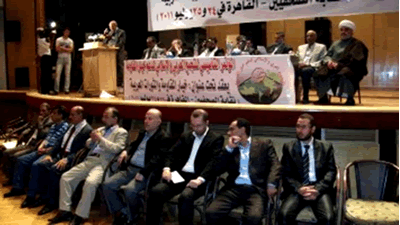
The Option of "Resistance" (i.e., terrorism) conference held at the Egyptian Press Syndicate on July 24-25 (Elbadil.org website. July 24, 2011). The banner reads "Founding Conference of the Arab-Islamic Gathering to Support the Option of Resistance. The theme of the conference is 'The option of Arab Resistance and Revolutions,' (the conference is held) at the Press Syndicate."
Egypt: anti-Israel and pro-Terrorism Conference held in Cairo
Cairo recently hosted a conference in support of the “resistance” (i.e., terrorism). It was attended by Palestinian and Shi’ite terrorist organizations (Hamas and Hezbollah), and representatives from Arab and Muslim countries. There were indications that the Muslim Brotherhood and Islamist groups attempted to use the popular Arab protests to support terrorism.
Overview
On July 24-25 a “founding conference” was held at the Press Syndicate in Cairo, Egypt, in support of the so-called “resistance” (i.e., terrorism). Its title was the “Founding Conference of the Arab-Islamic Gathering to Support the Option of Resistance” (henceforth “the conference”). It was attended by representatives from 14 Arab-Muslim countries, among them Egypt, Saudi Arabia, Syria, Lebanon, Sudan, Tunisia, “Palestine,” Morocco, Turkey, Iran and Indonesia. There were also representatives from Hezbollah, Hamas and other Palestinian terrorist organizations, and a representative from the anti-American “resistance” in Iraq. (For information about the various representatives, see the Appendix).
Before and during the conference institutions were set up and their heads were appointed: The conference was chaired by Dr. Hussam Issa from Egypt. Issa is a Nasserist, lectures on law at Ein Shams University and is a member of the committee to restore public money, established after the overthrow of the Mubarak regime. His deputies are Dr. Muhammad Sadek al-Husseini from Iran, secretary general of the Iranian-Arab dialogue forum, a political columnist and commentator; and Dr. Ahmad Armouti, head of the Jordanian doctors’ union, affiliated with the Muslim Brotherhood. In addition, a founding team was appointed, headed by representatives from Egypt and Lebanon. Conference speakers included representatives from two Palestinian terrorist organizations of minor importance operating in Damascus (As-Saiqa and the Palestinian Popular Struggle Front). There was also a representative from Lebanon (a woman specializing in international law); a general secretariat of 50 was chosen.
The information we currently possess about the proceedings at the conference is initial and partial. Apparently, an attempt was made to link the popular protests in the Arab world to support for terrorism (“the resistance”) and opposition to peace agreements with Israel, led by the various movements and groups affiliated with radical Islam, primarily the Muslim Brotherhood. Speeches were given stressing that the “resistance” (i.e., terrorism) was the only option for “liberating Palestine,” and material was distributed glorifying terrorist activities against Israel.
An example of the spirit of the conference was a speech given by Usama Hamdan, responsible for Hamas’ international relations. He said that “the [Palestinian-Israeli] conflict will never come to an end until Israel comes to an end. Regarding what some have demanded of us, to recognize the enemy, that matter is behind us. We then clearly said that we will never recognize Israel, and today I say more than that, [I say that] Israel completely doesn’t exist in our political or intellectual dictionary” (Hamas’ Al-Quds TV, July 24, 2011). Hamdan made statements in the same spirit in an interview with the website of Egypt’s El-Amal Party. He said that the “liberation of Palestine” would be achieved only through “resistance” (i.e., terrorism), stressing that the “resistance” would continue “until the liberation of the lands of Palestine from the [Mediterranean] sea to the [Jordan] river” (El-Amal website, July 25, 2011).
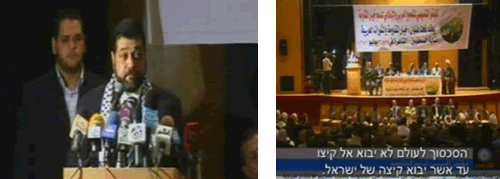
Usama Hamdan speaks at the conference "The conflict will not end as long as Israkeckeli exists" (Al-Quds TV, July 24, 2011)
httpv://www.youtube.com/watch?v=Uezmc-HFrQo
The Egyptian Aspect
A number of Egyptian representatives participated in the conference, and one of them, Dr. Hussam Issa, a Nasserist who lectures on law at Al-Shams University, was appointed to chair it. However, there was no official Egyptian participation, and no representatives who were affiliated with the regime, and the conference itself was not widely covered by mainstream Egyptian media.
The conference was ignored by the Egyptian regime and was sponsored by the Press Syndicate in Cairo, in all probability influenced by the Muslim Brotherhood, and held at Syndicate headquarters. Sheikh al-Azhar, Ahmed al-Tayeb, a senior religious authority in Egypt and in the Sunni Muslim world, met with representatives from Iran and Hezbollah and praised them for their “assertive positions in guarding the values of the islamic nation and its holy places…” He also said that “al-Azhar will always be receptive to various schools within the [Muslim] nation” (Al-Masri Al-Yawm and Alhbarelyom.org.eg, July 27, 2011). In our assessment, he was sending a kind of message of reconciliation from the Egyptian religious establishment to the conference’s Shi’ite representatives.
The authorization given by the Egyptian regime to hold the terrorism-supporting conference in Cairo, where representatives from the Palestinian terrorist organizations and Hezbollah joined Islamists (such as the Muslim Brotherhood) and representatives from terrorism sponsoring countries like Iran and Syria, was exceptional and would not have been allowed under Mubarak. In our assessment the main reason the regime did in this case allow the conference to be held was its desire to prevent friction with anti-Israeli elements, especially the Muslim Brotherhood, in view of the extreme sensitivity current in internal Egyptian affairs.
At the conference, there were traces of the influence of the Muslim Brotherhood and various radical Islamist group, although they were kept hidden from the public eye. In our assessment, the involvement of the Muslim Brotherhood and other Islamist elements was another manifestation of the legitimacy the movement has won since the fall of the Mubarak regime. It was also a manifestation of the readiness of the current regime to allow it to promote its relations with other Islamist groups in the Palestinian arena (Hamas) and the Arab-Muslim world, based on its anti-Israeli platform.
The Conference in the Shadow of the Changes in the Arab World
The slogan of the conference was “The option of resistance and the Arab revolutions.” Behind the scenes were the political fluctuations in Egypt and the Arab world, whose influences were strongly felt. The speeches at the conference made a clear attempt to harness the popular Arab protests to promoting the path of terrorism, rejecting the peace process and strict opposition to the right of the State of Israel to exist.
For example:
1) Conference speakers, such as Lebanese representative Dr. Yehya Ghaddar, praised the Egyptian popular revolution. Others, such as the speaker for the extreme Islamist Liberation Party, said that the conference believed in democracy. Usama Hamdan, the Hamas representative, praised the “Arab revolutions,” calling them a victory over external dictates from the enemies of the [Islamic] nation (Usama Hamdan operates at Hamas headquarters in Damascus with the sponsorship of the Syrian regime, which is currently cracking down on Syria’s popular protests). Other participants connected the path of “resistance” (i.e., terrorism) and the popular protests in the Arab world. In addition, Sheikh al-Azhar, who met with Iranian and Hezbollah representatives, also rode the wave, saying that “post-revolutionary Egypt praises the assertive positions of those preserving the values of the Islamic nation and its holy places…” (Akhbarelyom.org.eg and assadin websites, July 27, 2011).
2) On the other hand, remarks were made in support of the Syrian regime (which has brutally oppressed the public protests), claiming the regime supported the so-called “resistance” and helped [Hezbollah] during the Second Lebanon War. A correspondent who criticized Syria and accused Hezbollah of slaughtering Syrians in the name of the Syrian regime, was attacked and referred to as “an agent.”[1] Thus it can be seen that regimes, such as the one in Syria, opposing the wave of popular protest are trying to enlist the support of terrorism (“the resistance”).
Appendix
Initial Information about Some of the “Resistance” Conference Participants
Representatives of the Terrorist Organizations and Islamist Groups
Hezbollah was represented at the conference by Hassan Izz al-Din, responsible for Hezbollah’s relations with the Arab countries in the organization’s political council. He spoke in the name of Hezbollah leader Hassan Nasrallah.
Hamas:
A. Usama Hamdan, responsible for international relations in Hamas’ “external” headquarters (in Damascus).
B. Ali Barakeh, Hamas representative in Lebanon.
Representatives of other Palestinian terrorist organizations:
A. Zakaria Dughmush (Abu Qassem): Faction head, split from the Popular Resistance Committees in the Gaza Strip, in our assessment is sponsored by Hamas. Attended the conference as head of a delegation of networks operating in the Gaza Strip called the “Popular Resistance Movement.” The network has a military-terrorist wing called “Nasser Salah al-Din Brigades.” At the conference PRM operatives distributed propaganda (leaflets, documentary videos, songs) glorifying the Brigades’ terrorist activities.
B. Dr. Ghazi Hussein: Head of the political bureau of As-Saiqa, a minor Palestinian terrorist organization. It operates out of Damascus handled by the Syrian regime. Hussein was appointed a conference spokesman.
C. Dr. Kahled Abd al-Majid: Secretary general of a Palestinian terrorist organization of little importance today called the Popular Struggle Front, which operates out of Damascus and is sponsored by the Syrian regime.
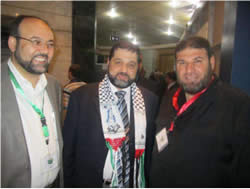
Ali Barakeh; center: Usama Hamdan; right: Zakaria Dughmush; picture from the conference (Popular Resistance Movement website, July 24, 2011).
The conference was also attended by Sheikh Jawad al-Khalidi, a so-called representative of the “Iraqi resistance,” i.e., groups fighting the American forces in Iraq. Al-Khalidi is a senior Shi’ite cleric (Ayatollah), secretary general of an Islamic organization called the Islamic Movement in Iraq (which in turn belongs to a coalition called the Islamic Front for the Liberation of Iraq, which has a military wing).
The Islamic Liberation Party (ILP) (Hizb al-Tahrir al-Islami): The ILP is a radical pan-Islamic political movement, initially Palestinian, with branches throughout the Middle East and the world. It seeks to restore the Caliphate and return to Islam’s original values. It is in favor of “the liberation of Palestine” (i.e., the destruction of the State of Israel) through jihad, but does not take part in terrorist activities and does not have a military-terrorist wing.[2] It was represented at the conference by Rushdi Ghanem, previously reported to be “head of the Liberation Party in North Sinai” (Al-Yawm Al-Sabaa, May 6, 2011). His speech at the conference paid lip-service to democracy but stressed the necessity of “supporting the resistance, the options of resistance, and the weapon of resistance as the authentic response to the trinity of occupation, dictatorship and reaction.”[3]
Representatives from Arab-Muslim countries
Egypt:
A. Dr. Hussam Issa: A Nasserist, has a PhD from the Sorbonne, lectures on law at Al-Shams University. Was formerly a member of the Nasserist party political bureau. Member of the committee to restore public funds established after the overthrow of the Mubarak regime. Appointed conference spokesman.
B. Salah al-Din Dasuki: Identified with the Mubarak regime. Chosen as secretary general of the conference’s 11-man founding team.
C. Abu al-Ala Madhi: Chairman of the Al-Wasat[4] Party, which favors religious moderation.
D. Dr. Gamal Zahran: Independent member of the Egyptian Parliament. Thanked Hezbollah leader Hassan Nasrallah in a speech before the conference, describing him as a “symbol of the resistance.”
Iran:
A. Nasser Sudani: Member of the Iranian Parliament. Spoke at the conference; other Iranian Parliament members also attended.
B. Dr. Muhammed Sadek al-Husseini: Secretary general of the Arab-Iranian Dialogue Forum. Political columnist and commentator. Spoke at the conference; appointed its deputy chairman.
Lebanon:
A. Dr. Yehya Ghaddar: Shi’ite from the Sidon region. Heads a body called The National Gathering to Support the Resistance Option. Was particularly vicious concerning Israel, which he referred to as “cancerous.” Appointed to chair the founding team of the committee to support the so-called “resistance.”
B. Dr. Ihlas Bidhon: Shi’ite, expert in international law. Appointed conference spokeswoman.
C. Hassan Izz al-Din: Hezbollah representative.

Yehya Ghaddar praises released terrorist operative Samir Kuntar on his return to Lebanon (YouTube.com website).
Jordan:
Jordan was represented at the conference by Dr. Ahmed Armouti, chairman of the Jordanian doctor’s union, affiliated with the Jordanian Muslim Brotherhood. Appointed deputy chairman of the conference.
Notes:
[1] News.maktoob.com website
[2] The party was founded in Jordan before 1967 and from there spread to the Arab-Muslim world and Muslim communities in Central and Southeast Asia and in Western countries.
[3] Alankabout.com website.
[4] A party which split from the Muslim Brotherhood in the 1990s. In favor of religious moderation. Defines itself as a civilian party whose authority rests on Islamic religious law (Shari’ah).



 RSS
RSS

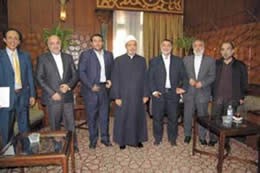
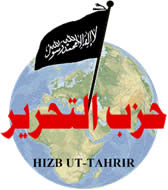
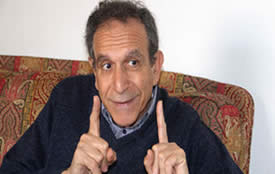
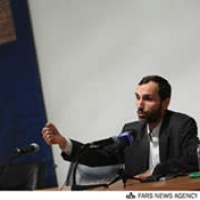


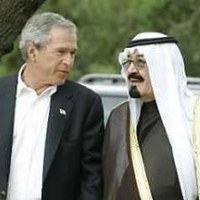
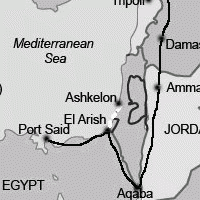




#Egypt: anti-Israel and pro-Terrorism Conference held in Cairo | #Israel #Hamas #MB http://t.co/z8ApijP
Egypt: anti-Israel and pro-Terrorism Conference held in Cairo … http://t.co/8KSyWkp
#Egypt: anti-Israel and pro-Terrorism Conference held in Cairo | #Israel #Hamas #MB http://t.co/z8ApijP